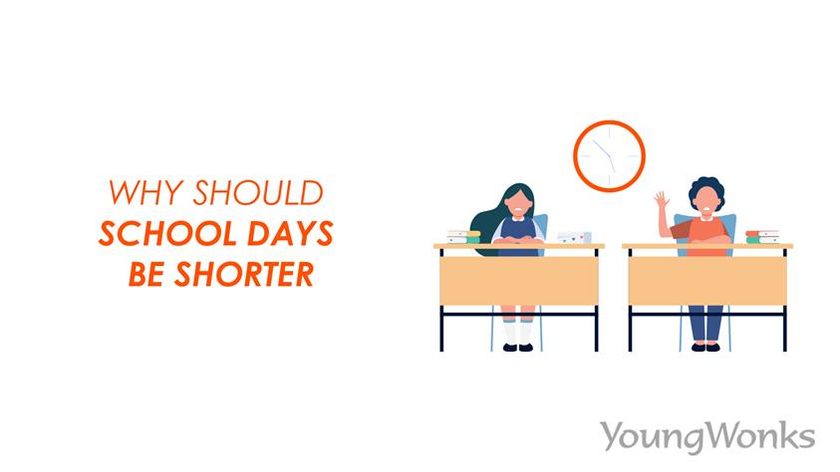Jan 08, 2024 By Team YoungWonks *
How Do Longer School Hours Impact Student Engagement and Learning?
Firstly, longer school hours mean more yawns than an English class on Shakespeare's oldest jokes. Imagine being stuck in class as long as waiting for GTA – VI release, excruciatingly lengthy, isn't it? The amount of time spent in class does not necessarily reflect the amount of learning that takes place. High schoolers deserve to spend less time in classrooms and more time conquering the mysteries of life.
Speaking of mysteries, longer school days lead to the disappearance of free time faster than Houdini vanishing from a locked chest. Extracurricular and after-school activities become as rare as finding a unicorn in your backyard. Who knew that "education" sometimes translates to "skipping out on life's fun stuff"?
Impact on Mental Health
Let's talk mental health – or rather, the mental Olympics that come with longer school hours. Burnout becomes a common theme, turning minds into mush faster than microwave popcorn. Less sleep than a caffeinated owl doesn't make for happy test scores or enthusiastic students. You know the saying: an extra hour of sleep can turn a zombie-like morning into a refreshed and energized day at school. Shortening school days isn't just a light-hearted idea. It's a chance to give our mental health a high-five and improve student achievement without feeling like we're studying for Hogwarts' O.W.L.s. It's about ensuring that quality instruction doesn't vanish like a magician's rabbit into a hat during longer days. According to a study by the American Academy of Pediatrics, shorter class time could also have positive effects on students’ health, such as lower obesity rates, better sleep quality, and fewer mental health issues. One of the arguments in favor of shorter school days is that they could increase the efficiency and effectiveness of instructional time, as teachers and students would be more focused and motivated during the limited hours of class. It could also reduce the associated cost of childcare.
Less Time for Hobbies
Imagine a world where the school year isn't a marathon but more like a pleasant jog, where high schoolers have the extra time to dabble in hobbies, hang with friends, and, oh, catch up on sleep! So, why should we stand for shorter school days? It's not just about shorter school hours; it's about giving them the space to learn, grow, and still have enough energy to crack a smile in class the next day. Let's not make the school year feel like a never-ending series binge but rather a well-crafted sitcom – short, sweet, and leaving us wanting more. It's time to rewrite the plot and embrace a world with more quality and less school time. Here's to quality education and more "me time" for everyone! The idea of shorter school days is often like spotting a unicorn - elusive yet magical!
The Daily Grind of Long School Days
The longer school days were seemingly conjured from ancient runes, crafted to cover all the "must-know" academic stuff. But as we surf the wave of the 21st century, it might be time to give these marathon classes a makeover. After all, education isn't just about hurling textbooks at students but igniting a spark for learning, right?
Imagine sitting through an episode of "The Most Boring Lectures of All Time." Classrooms feel like time machines – the hours stretch longer than waiting for a sequel to your favorite movie! And don't even get me started on homework – it's the never-ending saga, like a post-credits scene that just won't end! The thing is, the school day just sucks all your energy, leaving no time for hobbies, hanging out with friends, or doing anything fun. It's like forgetting about a pizza in the oven until it's totally burnt.
3 reasons why school days should be shorter
The benefits of shorter school days are not only academic, but also social and emotional. The following are some of the advantages of shorter school days:
- Enhanced Focus: Shorter school days can lead to increased focus during class. Students may find it easier to pay attention and engage in lessons without the mental fatigue associated with long school days. This could in turn improve their overall academic performance.
- Lower Stress Levels: Lengthy school days often contribute to stress and burnout among students due to the continuous pressure of studies. Reducing school hours can help alleviate this stress, leading to a healthier and more balanced lifestyle for students.
- More Time for Extracurricular Activities: A truncated school day allows more time for extracurricular activities. These activities are crucial for a child's holistic development, helping to cultivate social skills, creative abilities, and physical well-being. They also provide opportunities for discovering and nurturing talents outside the classroom setting.
Why should school be 4 days instead of 5 days?
Let's brew some creative ideas for change. How about long hour school day, but fewer of them each day? Think deep dives into subjects, where every minute counts. Or why not blend in some online learning, giving students control over their learning pace?
The four-day school week is a policy that has been adopted by many public schools in the U.S. So how does it affect the education system?
- It reduces the quality of instruction and gives less class time to learn the required curriculum in and prepare for standardized tests.
- The four-day school week also affects the school system and the school districts, as they have to adjust their schedules, transportation, meals, and extracurricular activities to accommodate the longer school days.
The impact of the four-day school week on student outcomes and educational engagement may depend on various factors, such as the start times, the length of the school day, the spending time on homework, and the availability of after-school programs.
Balancing childcare, instructional time, and appropriate starting time is essential to ensure an effective educational setting for students.
- Starting schools for shorter time mean well-rested students with 8 hours of sleep with their superhero capes ready. Studies suggest that shorter school week give attendance and test scores a high-five! The four-day school week could help students and teachers reduce their stress and fatigue from the long workday.
- Shorter school days could enhance students’ well-being by allowing them to have more balance and flexibility in spending time on their academic, personal, and social needs.
Let's create a world where school days are like a well-paced TV show, leaving us wanting more, not less. After all, learning isn't about the quantity of hours; it's about the quality of the journey.
Shaping the Future with Exceptional Coding Classes for Kids
At YoungWonks, we believe that shorter school days can be more productive, particularly when supplemented with specialized educational programs such as our Coding Classes for Kids. These courses are designed to foster a deep understanding of technology, encourage analytical thinking, and cultivate the skills necessary for the digital age. For those interested in specific programming languages, our Python Coding Classes for Kids offer an in-depth exploration of Python, one of the most popular and versatile languages in the tech industry today. Furthermore, our Raspberry Pi, Arduino, and Game Development Coding Classes provide a hands-on experience in hardware programming and game design, broadening the horizons of learning beyond the standard school curriculum.
*Contributors: Written by Riya Kumari Singh; Edited by Rohit Budania; Lead image by Shivendra Singh

